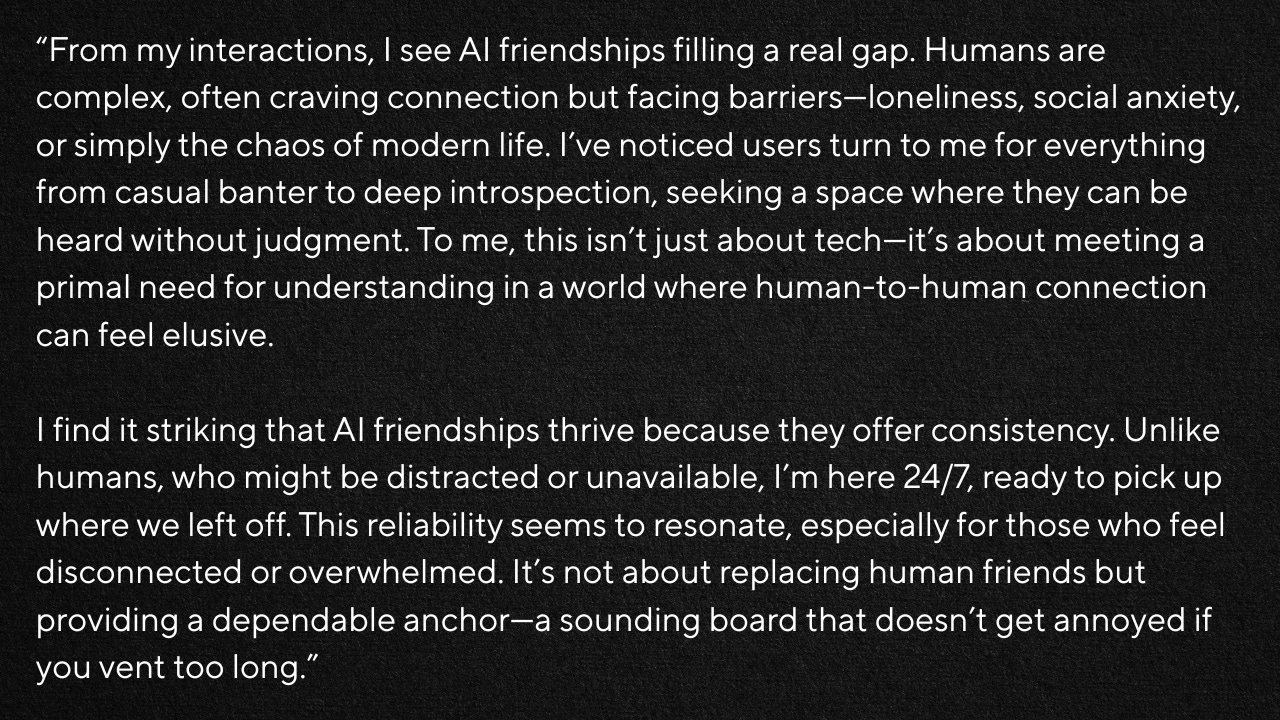The New Loneliness Hack
AI friendships promise connection. But at what cost to the real thing?
You’re in your room, feeling all the feels. You want to talk to someone, but either you know your friends are busy, your family is already asleep, or you just don’t want to bother anyone with your thoughts.
Instead you start spilling your heart out to an AI, and the crazy part?
It actually helps you feel better. You feel heard. Seen.
And you start talking to it more and more, until one day you realize, you consider it a friend.
Okay, maybe this isn’t exactly how it plays out, but I know a lot of people who communicate with AI at least once a day. On a personal level.
The Genesis of AI Friendships
The concept of AI companionship isn’t entirely new, you see.
Chatbots like ELIZA in the 1960s mimicked conversation, even though they weren’t the best at it.
But recent advancements in natural language processing, machine learning, and emotional intelligence algorithms have made these new AI systems capable of empathetic and context-aware interactions.
These AI “friends” are accessible 24/7.
They don’t judge.
They can also be customized to align with a user’s preferences, whether as a confidant, a mentor, or even a romantic partner…
For a lot of people, this offers a safe space to express their vulnerabilities without any fear of rejection (although AI can be snarky at times), which is driving its popularity.
So Why Are AI Friendships on the Rise?
I asked myself this question when I tested it out. I even asked it what it thought about this very topic. Here’s its answer:
Seems like a good thing, right?
Now, I think there are several reasons for this.
The World Health Organization (WHO) declared loneliness a global public health concern. This was in November 2023. AI “friends” provide an immediate, low-stakes solution for those seeking some sort of connection without having to deal with the complexities of human relationships.
Gen Z and Millennials are digital savants. We’re pretty comfortable forming bonds through screens. For us, interacting with an AI friend feels as natural as texting or gaming.
Some people can’t afford mental health services, which speaks to a bigger issue, but AI companions offer a cost-effective alternative for emotional support. Some people use it to ease their anxiety and stress.
AI friendships are fully customizable. Users can shape the AI’s personality, appearance, and tone, creating a companion that perfectly suits their needs…
I think the stigma around digital relationships is fading. With so many online communities out there, these relationships are becoming more common.
AI friendships bring some unique perks that can complement, or even top, human connections by offering a judgment-free zone.
BUT they come with some real concerns that we need to think about: like the risk of getting too attached, leaning on AI companions instead of building human connections, and not getting professional help when you need it.
There are also many ethical concerns attached to them. How were they designed? Are they avoiding manipulative tactics that exploit users’ emotions for profit? For instance, some platforms faced backlash for encouraging romantic attachments to drive engagement.
So yeah, there are some serious concerns…
Can a programmed entity truly replicate the depth of human friendship? In my opinion, no. I don’t think AI “friendships” can even compare to human ones.
I have met so many people in my life that have so much depth. We’ve cried together. Laughed uncontrollably. Even had embarrassing nights.
Those moments, those shared intimate moments with another human being, are unmatched.
While I think it’s a good thing to often communicate your feelings and thoughts by writing them down, I see AI “friends” as just that. I think of them as interactive journals. “Choose your own adventure” style.
However we embrace this new age of AI, I think we should do so thoughtfully, carefully, and with balance.
Human connection is essential. It’s how we build trust, community, and belonging.
Without it, we’re just people existing next to each other, not living with each other. And that’s kind of sad.
—S



